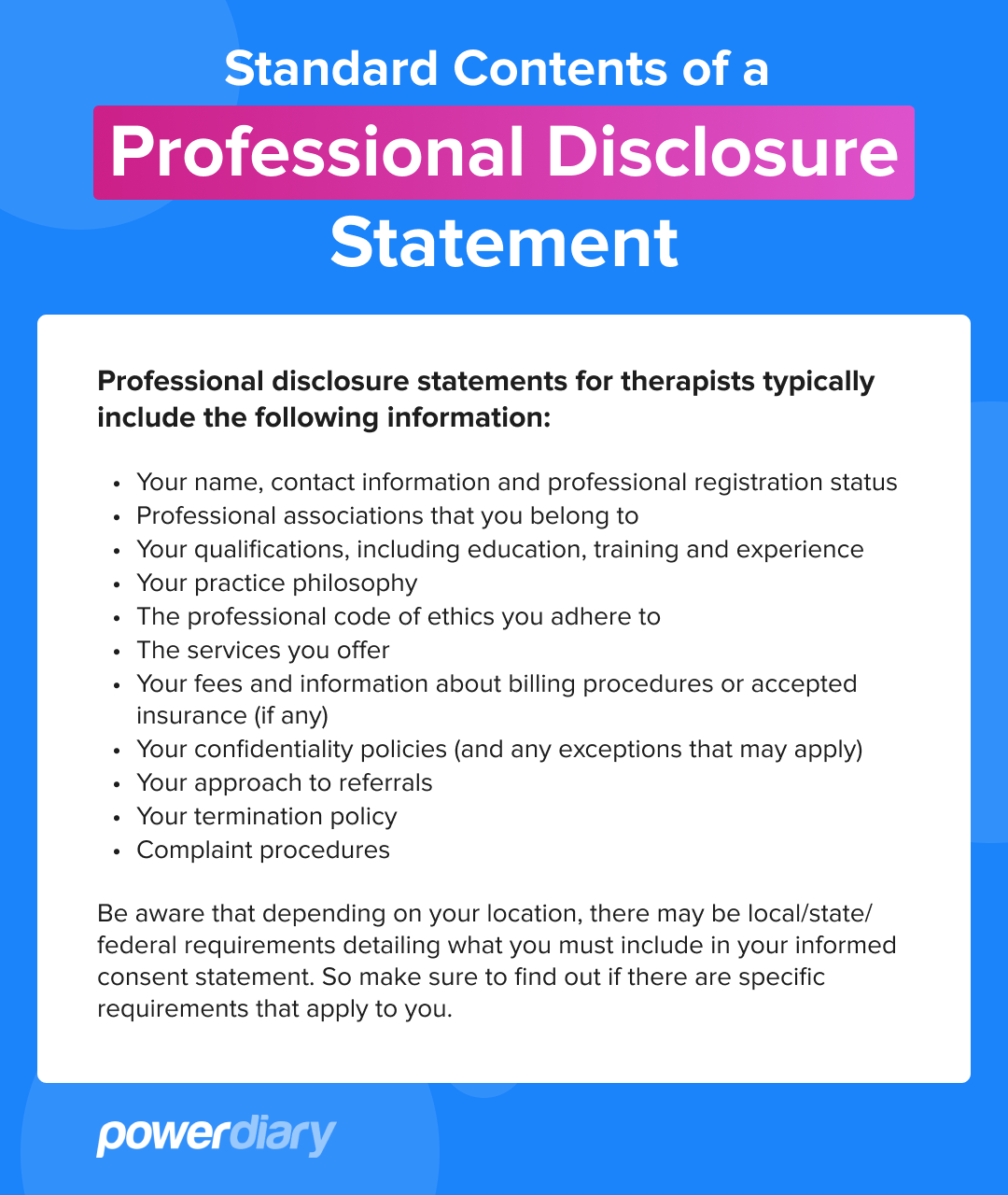A professional disclosure statement for therapy, also known as an informed consent statement, defines the terms and conditions of the therapist-client relationship.
First, professional disclosure statements safeguard the interests of both therapists and clients. By clearly communicating essential details about qualifications, services, fees, and confidentiality policies, therapists establish realistic client expectations right from the start. This way, the client doesn’t get any surprises when they’re billed for your services or when they cancel an appointment. Referring your client back to this document means you’re better able to avoid an uncomfortable situation down the track.
These statements also play a vital role in building trust between therapists and clients. They help therapists demonstrate their commitment to ethical and professional care by outlining clients’ rights and responsibilities.
Writing a professional disclosure statement requires a delicate balance of professionalism and clarity. Clients should be able to understand it easily so they have the necessary information to make informed decisions.
This article details what professional disclosure statements for therapists typically include, how to write one and tips for sharing with clients. Let’s get started!
Important note from our Legal Eagles: We know you know this, but we need to say it anyway. The information in this article is general in nature and is not legal advice. If you’re unsure of the rules that apply to you, your professional association is often a good place to start.
The Standard Contents of a Professional Disclosure Statement
Professional disclosure statements for therapists typically include the following information:
- Your name, contact information and professional registration status
- Professional associations that you belong to
- Your qualifications, including education, training and experience
- Your practice philosophy
- The professional code of ethics you adhere to
- The services you offer
- Your fees and information about billing procedures or accepted insurance (if any)
- Your confidentiality policies (and any exceptions that may apply)
- Your approach to referrals
- Your termination policy
- Complaint procedures
Be aware that depending on your location, there may be local/state/federal requirements detailing what you must include in your informed consent statement. So make sure to find out if there are specific requirements that apply to you.
How to Write a Professional Disclosure Statement for Therapists
When writing a professional disclosure statement, tailor it to your practice. The statement should be clear, concise and easy to understand. It’s also important to review and update your statement regularly to ensure it’s up-to-date.
Here are some additional tips for writing a professional disclosure statement:
- Avoid jargon and technical terms
- Be specific and provide as much information as possible
- Be honest and transparent about your qualifications and experience
- Make sure there’s no room for misinterpretation anywhere
- Incorporate necessary ethical and legal standards
- Consider any potential challenges you may face in client care and how you would like to manage this
- Have a colleague or friend read it, provide you with feedback, and identify any confusing words or sentences
If you’re unsure how to proceed, get professional assistance developing the form to ensure it meets all requirements.
Therapist Professional Disclosure Statement Example
Here’s an example of a professional disclosure statement you can configure to your preferences.
PROFESSIONAL DISCLOSURE STATEMENT FOR THERAPY SERVICES
Dear [Client Name],
Thank you for choosing my practice. Below, I will inform you about my background and approach to therapy and, most importantly, ensure you are aware of your rights in the therapeutic process.
This form is supplied to you in respect of [Insert local legal/regulatory requirement here].
Therapist Information
Name: [Your Name]
Contact Information: [Your Phone Number]
Registration Number: [Your Registration Number]
Qualifications & Experience
I hold a [Degree/Certification] in [Field of Study] from [Educational Institution]. I have received specialised training in [Specific Training Programs]. With [#] years of experience, I have worked extensively with [Population] facing [presenting problems] and use a variety of interventions, including [Insert therapeutic approaches you are trained in].
[Therapy Type] Philosophy
My [Therapy Type] philosophy is rooted in a client-centred approach. I believe in providing a safe, non-judgmental, and empathetic environment where you can openly explore your thoughts, feelings, and concerns. I strive to collaborate with you to develop effective strategies and techniques tailored to your unique needs, promoting personal growth and positive change.
Services Offered
I offer individual therapy sessions that address a wide range of issues, including but not limited to [List of Therapy Areas]. In each session, I aim to meet your specific goals and needs, and we will work together to develop a personalised treatment plan. Standard therapy sessions last [#] minutes each.
Fees, Billing, & Cancellation
The fee for each therapy session of [#] minutes is [Amount]. I accept payment in the form of [Accepted Forms of Payment]. Payment must be made [Stipulate when a client must settle their bill].
In Australia, you may be eligible to access subsidised sessions through Medicare. To claim a Medicare rebate, you must obtain a Mental Health Treatment Plan and referral from your GP.
Please note that I [Do/Do Not] accept private health insurance. If you have insurance coverage, you must contact your insurance provider to determine if my services are covered and determine any necessary reimbursement procedures.
Please provide at least 24 hours’ notice for any cancellations or changes to our scheduled sessions.
If you need to cancel or reschedule an appointment, please notify me as soon as possible by phone or email. If you provide the required 24-hour notice, there will be no charge for the missed session.
In the event of a late cancellation or a missed appointment without prior notice, the full session fee will be charged. This fee is necessary as it compensates for the time reserved exclusively for you and allows me to maintain the availability of my services for other clients.
Confidentiality Policies
Confidentiality is of utmost importance, and I adhere to strict professional and legal standards to protect your privacy [Insert details here if so desired]. Our sessions will remain confidential, and I will not disclose any information without your written consent, except in the following circumstances: [List any exceptions to confidentiality, such as situations involving risk of harm to self or others or legal obligations].
Referrals
If, during our work together, I believe you would benefit from additional or specialised services, I may suggest a referral to other professionals. I will discuss this with you openly and collaboratively, ensuring your needs are met in the best possible way.
Termination Policy
Either you or I may choose to terminate therapy at any time. If you decide to discontinue our sessions, I encourage you to discuss your reasons with me so we can work towards a smooth and appropriate ending. Similarly, I will provide you with advanced notice if I believe it is in your best interest to terminate our therapeutic relationship.
Complaint Procedures
If you have any concerns or complaints about our work together, I am committed to addressing them promptly and ethically. Please feel free to discuss any issues with me directly, and we will work together to find a resolution. If we cannot resolve the matter, you have the right to contact [Appropriate Regulatory Body] at [Contact Information] to file a complaint.
Please read this professional disclosure statement carefully and let me know if you have any questions or concerns. Your signature below indicates that you have understood and agreed to the above-mentioned terms.
Client’s Signature:
Date:
Share It With Your Clients
Once you’ve written your professional disclosure statement, you should share it with your clients at the beginning of therapy. You can do this by providing them with a copy of the statement in advance or by discussing it with them in person. It’s crucial to reinforce the importance of clients reviewing and understanding the statement before signing it, so they’re not surprised by cancellation fees or other missed details moving forward.
It’s easy to convert your professional disclosure statement into an electronic form with Power Diary’s clinic management software. That way, clients can review and sign it before they arrive at their first appointment. It’s also simple to add it to Power Diary’s Practice Operations Manual for easy access by team members!
You can use Power Diary’s online form feature for other purposes as well. We provide users with easy-to-follow instructions for setting up and sending out forms, and customer support is available 24/7.








